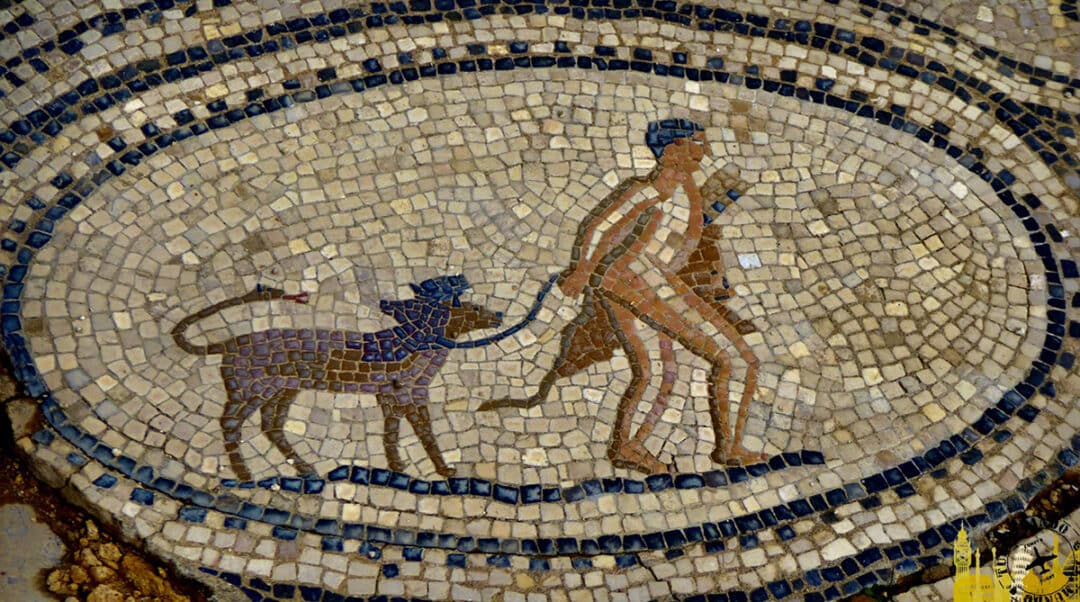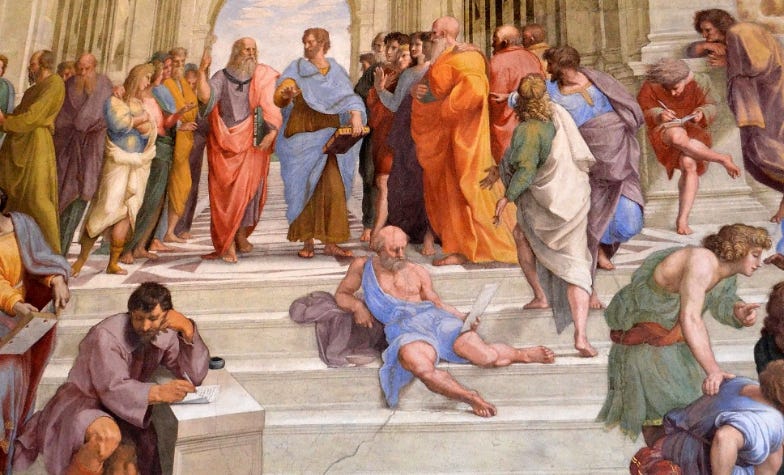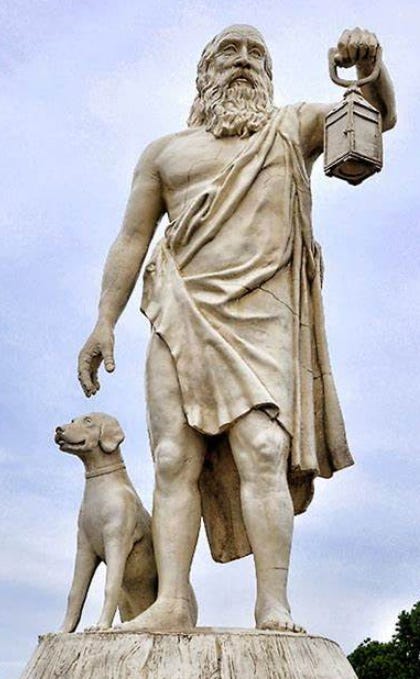

Dogs Bark (Deep Resistance Part 3)
by W.D. James | Jan 19, 2024
Hear this dog bark
Watch the trees sway
Keep the candle burning
Both night and day
Many invade
I take no quarter
This is my land
I’ll never surrender
I’m a warriori
– John Lydon, Public Image Limited (PiL), Warrior
As we saw in the previous essay, the fundamental distinction for the Cynic is between nature and social custom. Which can you stand on? As the Cynic Jesus put it, it is a foolish person who builds their house on sand instead of rock. To the Cynic, the rock is nature. As Hadot puts it: “The Cynic chose his way of life because he believed that the state of nature (phusis), as seen in the behavior of animals or children, was superior to the conventions (nomos) of civilization.”ii
In this essay, we’ll look at four more ‘spiritual exercises’ that Diogenes practiced. As before, we’ll gather together ‘fragments’ of his teaching under each heading then explore the exercise he was advocating and, from there, move on to deducing practices of resistance we might implement.
Philosophical Practices
Practice 3: Sticking Close to Nature
We are not as hardy, free, or accomplished as animals. (8)iii
Everything is of one substance. It is custom, not reason, that sets the temple apart from the house, mutton from human flesh for the table, bread from vegetable, vegetable from meat. (21)
Raising sons: teach them poetry, history, and philosophy. Geometry and music are not essential, and can be learned later. Teach them to ride a horse, to shoot a true bow, to master the slingshot and javelin. At the gymnasium they should exercise only so much as gives them good color and a trim body. Teach them to wait upon themselves at home, and to enjoy ordinary food, and to drink water rather than wine. Crop their hair close. No ornaments. Have them wear a thin smock, go barefoot, be silent and never gawk at people in the street. (55)
A blush is the color of virtue. (111)
The greatest beauty of humankind is frankness. (122)

Diogenes thinks animals might have it more right than we do. He probably goes too far here. Human nature is different in some key ways to that of other animals, so we should not seek to live exactly as they do. Nevertheless, that we can learn of nature, her ways, and to an extent find models for human action amongst the other creatures seems like a wholesome notion. He is seeking the fulfillment of nature, which might include aspects not present with animals, but which surely should not fall below the level of animals. If we aren’t succeeding in being free, hardy, and accomplished, we have gone wrong somewhere. In his recommendations regarding the education of the young, he recognizes this. We are intelligent souls, so we need to know about the sacredness of language (poesis really goes beyond language; it covers all forms of ‘making’ in accord with the ways of nature), thought, and our own story. Beyond that, he does not emphasize intellectual development, but there is room for it. Physical culture, within reasonable limits (no body-builders here), is equally important. Further, the young should become physically and morally resilient: valuing function, not ornament, and being accustomed to endure some hardship. The soul and the body, not custom, provide the standard.
Further, Diogenes points to an innate basis for virtue and morality. In blushing, our bodies participate in a natural sense of propriety. Really, for Diogenes, body and soul are not distinct. As he says, everything is of one substance. His is a fairly hard metaphysical materialism, but not reductive in the modern way. We should probably think of his view of nature and matter along the lines of Aristotle. There is matter but mixed right in with it is some principle of order and meaning. The function of our speaking is to adhere to this, to be truth tellers, not ad-men, propagandists, spin doctors, flatterers, etc…. Truth is nature manifest in human speech and thought.

Practice 4: Subversive Piety
Can you believe that Pataikion the thief will fare better in Elysion because of his initiation into the Mysteries than Epameinondas the Pythagorean? (38)
A choirmaster pitches the note higher than he knows the choristers can manage. So do I. (60)
A good man is a picture of a god. (79)
After grace and a prayer for health the banqueters set to and eat themselves into an apoplexy. (103)
To a woman who had flopped down before an altar with her butt in the air I remarked in passing that the god was also behind her. (104)
Diogenes is often at his best, and his funniest, when taking on religion and piety. There is a genuine, natural piety in his thought and practice. A good person is godlike. Be good; that’s good. He means to ‘aim high’.
But often our ‘piety’ is no such thing. Do our religious (or ideological, for that matter) rituals actually make us better? If not, they are not really part of piety. Are they just empty forms? Even worse. Are they just for show? Positively evil.
He has no problem offending people (see the next practice for a strong example). However, it’s an educative offense he means to offer. And the educator, presumably, has something genuine to offer. He is not a nihilist and not some sort of adolescent rebel. He’s so strong in his denunciations because he is so serious in his affirmations.
Practice 5: Self-Sufficiency
If only I could free myself from hunger as well as from desire. (9)
Reason or a halter. (45)
For three thousand drachmas you can get a statue, for two coppers a quart of barley. (62)
Freedom for Diogenes usually takes the form of self-sufficiency, not political liberty, per se. To be free is to be independent: not dependent or subject to domination. At a basic level, that involves making rational choices consistent with freedom. You will have to undergo a lot more unfreedom (wage-work or whatever) to get a statue that really doesn’t do much for you. Our basic needs can be relatively cheaply met. One thinks here of Henry David Thoreau and the exact accounting he kept of how much ‘life’ he had to give up to meet his needs at Walden Pond (his point being to find the way of life that entailed the least cost, understood as the amount of ‘life’ that must be given up in exchange).
At a more abstract level, he teaches, we must live according to our reason (which involves no loss of freedom), or we must be restrained. The restraint might be self-imposed or socially imposed. Individually we might try to arrange our circumstances so that we avoid ‘temptations’. Socially, the state, its laws, and prisons are there.

Perhaps the most notorious story about Diogenes involves his scandalous public behavior. It is alluded to in Raphael’s masterpiece, The School of Athens, which portrays the classic philosophers and scientists in complex symbolic relationship to one another. Diogenes (the center of the detail of the image above) is portrayed in royal blue, indicating his self-sovereignty. His posture, and I think the object he is holding, suggest the episode. Other translations of Fragment 9 put it more like “If only I could free myself from hunger as easily as from desire.” Diogenes lives on through the ages as the sage who taught self-reliance by publicly masturbating in the marketplace. Again, Diogenes, and the Cynics, probably go too far. One suspects any would-be students present that day did not forget the lesson, though. The Stoics, to whom we’ll turn in the next essay, felt a more moderate path was open to more people and was more genuinely human, though they saw the Cynics as exemplars, not competitors. There was much to learn from the Cynics, but in their asceticism and willingness to offend, they had passed beyond the right measure.
Practice 6: Simplicity
I learned from the mice how to get along: no rent, no taxes, no grocery bill. (15)
When Plato said that if I’d gone to the Sicilian court as I was invited, I wouldn’t have to wash lettuce for a living I replied that if he had washed lettuce for a living he wouldn’t have had to go to the Sicilian court. (27)
I threw my cup away when I saw a child drinking from his hands at the trough. (35)
We have complicated every simple gift of the gods. (106)
Learn the pleasure of despising pleasure. (120)
He is also reminiscent of his latter-day disciple, Thoreau, whose admonition was to “simplify, simplify, simplify.” Here we hear him recounting lessons learned from animals and children. Don’t complicate things. Don’t get in unnecessary entanglements. There are natural blessings aplenty; don’t screw them up.

Fragment 120 probably offers an insight into the actual personality of Diogenes. The pleasure of despising pleasure. There is a conceitedness here. This is no mere following of the dictates of nature or of reason. There is an aristocratic contempt for the lowly here. A higher pleasure to be gained when one has rejected all the lower pleasures. On the one hand that could be the unvirtuous contempt of the aesthete for the ‘ordinary’ people of the world. I think with Diogenes it is other than that, though, and perhaps a lesson it might be worth learning, though with caution. There is an aristocracy of the spirit that is distinct from worldly hierarchies. Anyone who succeeds in rejecting unnatural and unreasonable social conventions will have joined a group that is small and in some ways set apart. They will also have cultivated a high level of character and be courageous in their opposition to shams.
Practices of Resistance
As with the two spiritual exercises discussed in the previous essay, we will now look at how to develop these four additional exercises into practices of resistance.
Stick close to nature
- Take Nature and reason as guides.
- Question and test values that the broader culture upholds.
- Seek to be true to the natural virtue implanted in us. Get in the habit of not doing things that don’t feel right.
- Avoid conventions that depart from nature.
- Know what your actual needs are; don’t become a slave to consumerism.
- Reject ideologies that fly in the face of common sense or violate your own conscience
Subversive Piety
- Avoid conformity to established religions when those have become perverted.
- Avoid conformity to established ideological substitutes (which are always perverted) such as ‘virtue signaling’.
- Seek and cultivate actual goodness.
- Fear becoming bad more than you fear being harmed.
- “Live in the truth” (Vaclav Havel).
Self-Sufficiency
- Work out your own ideas.
- Become independent of the legacy or establishment media.
- Make choices that make it easier to economically meet your needs.
- Be less dependent on, and subject to, those who can wield economic power over you.
- Do things for yourself if that is feasible. Cook your own food more often. Grow a bit of food, even if just a container or two on your balcony.
- Practice self-discipline so you don’t go off the rails without external discipline.
- Self-reliance is morally admirable.

Simplicity
- Identify a few core principles that you would stake your life on. Ones that you feel are true in your bones. Not many. But then use them as guides in everything you do.
- Accept the blessings nature gives us.
- Practice gratitude. Take time out to actually reflect back over the good things that have come your way that day. Perhaps the beauty of the sunset. This may be a little sappy, but sappiness is not a vice.
- Be simple in your lifestyle; shelter, food, adornment.
- Nothing in our media and consumer culture encourages us to be simple or to live simple lives. Resist the encouragement to complication. Take planned breaks from mass/social media.
- Let the true/real shine through simplicity.
Achieving a life lived according to nature and reason is a conquest. It won’t just happen. It will take wisdom and courage. Those who succeed will be, as Johnny says above, warriors.
i John Lydon (aka, Johhny Rotten), with his abrasive, iconoclastic, and witty take on things seems to channel the spirit of Diogenes. The self-reference to ‘hear this dog bark’ and probably the reference to the candle burning both day and night seem like pretty direct references to me. A famous story has Diogenes walking through Athens in broad daylight with a lit lamp looking for a human being. In an interview, Lydon commented on this song: “I’m making my case quite clear that this is my land and I’m not gonna surrender it easily. I’m sick of damn big businesses just burning up everything, destroying the food, destroying the sea, polluting the air. You know, I’ve got an actual birthright to these things – I’m damned if I’m gonna surrender it lightly.” Listen here: Public Image Limited P.I.L ‘Warrior’ on Countdown Revolution 1989 – YouTube
Unfortunately, the 80s seem to have been the bottom of the fashion curve, even for great bands.
ii Pierre Hadot, What is Ancient Philosophy?, translated by Michael Chase, Belknap Press of Harvard University Press, 2002 (original French edition, 1995), p. 110.
iii All quotes of Diogenes’ Fragments come from Guy Davenport, Herakleitos and Diogenes, Grey Fox Press, 1979. I will note the fragment being quoted parenthetically.
This essay was first published on Winter Oak
Contact Us
Follow Us
Privacy Policy
Sitemap
© 2024 FM Media Enterprises, Ltd.




